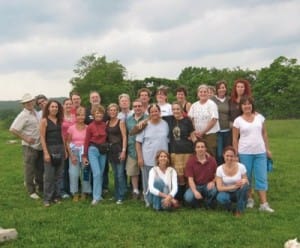By Alisha Irby, MS, Primary Therapist, Men’s Co-Occurring Disorders Program at The Ranch I am passionate about working as an addiction treatment therapist at The Ranch. My work is always changing because I believe there is no black-and-white approach to therapy. There are multiple ways to solve a problem and sometimes I use many different approaches in one day — or even in one session. It really depends on what the client chooses to bring into the session for the day. For example, a client who initially presents as emotionally escalated can begin a session with DBT (dialectical behavior therapy) skills and somatic work for grounding, and once regulated can transition into some solution-focused brief therapy goals. Once processed, this work can then go into experiential or inner-child work, or any direction the session may go. It really is all about where their head and the heart are in that moment. It is important to be able to recognize the specific needs of a client, instead of just sticking to a “one-model-fits-all” approach.
Goal Is the Same Though the Approach May Change
I typically tell clients that there can be more than one way to get to your end goal and there is more than one path to take on your journey ― the point is that you get there. In my own eclectic approach, here are some of the therapies I call upon:
- Solution-focused brief therapy (SFBT) is a goal-oriented, short-term therapy that focuses on a client’s current life and future rather than dwelling on past problems. It invites you to do more of what does work in your life and to complement the good. It includes a “miracle question” that encourages you to explore how you would respond if the problem were miraculously resolved.
- Somatic experiencing therapy takes the approach that past trauma can get trapped in your body. To access it, you learn to view yourself as a total person — body, mind and spirit. I often tell clients that their bodies tell them the truth, and this work allows the body to tell the truth. It essentially connects their head and their heart. This work can be very healing.
- Dialectical behavior therapy (DBT) is a highly specialized cognitive behavioral treatment based on mindfulness. In a nutshell, this type of psychotherapy helps you develop distress tolerance, interpersonal effectiveness, emotion regulation and radical acceptance of your problems and disappointments, giving you more power to solve them. I typically sum up DBT to clients as coping skills that may seem simple, yet are very effective once you take the time to implement them.
- Experiential therapy utilizes role-playing, guided imagery and a variety of activities to help bring to light issues or trauma that may be buried in your subconscious mind. Many clinicians at The Ranch practice some type of experiential therapy, which has provided invaluable healing for clients.
- Inner-child workdescribes an approach to helping you connect to the part of yourself that was deeply wounded in childhood and may still be acting out or suffering due to unresolved trauma. It involves finding out what is making the child within you react a certain way and looking for ways you can self-soothe.
Therapy Can Get You on the Right Track
Not every therapy works for each person. By the same token, there are often times when more than one approach is necessary to help an individual address a problem. The Ranch looks at all of the problems encompassing addiction, trauma, eating disorders or whatever brings people here. A multidisciplinary team of therapists looks at all of the pieces of the puzzle together and offers different ways to help. You can get different approaches by different people on any given day. Recovery might be a long process, but it’s important to start your journey. Therapy can help you build resiliency. It can aid with emotional regulation and crisis intervention. It can help you learn grounding skills for those times in life when you feel like you want to dissociate and leave the room, or run toward addictive behavior. It can help you be more present in your life so that you can take more action toward recovery.
Establishing a Committed Relationship With Recovery
Ultimately, when facing the disease of addiction, it is important to learn what a daily program of recovery should look like. Your recovery will be unique to you, but it should include aspects of practice and study, as well as guidance from a mentor and sober community, whether that happens in a 12-step fellowship or a meditation sangha. A good treatment program will help you tailor your maintenance program to your authentic self. In addition, it is important to incorporate things you actually enjoy doing into your daily program. The tools gained in therapy are essential to begin the recovery journey. It is vital for clients to have the recognition to understand the ongoing task to maintaining sobriety and mental health, to continue to work on trauma, and to use what has been learned to regulate their emotions. Recovery is about healing and growing.


